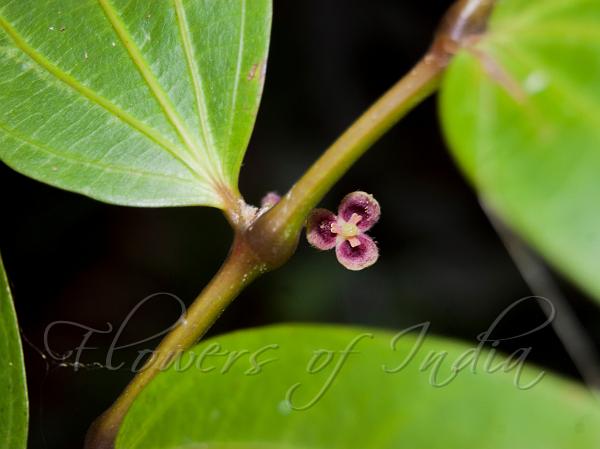|
| Kerala Thottea |
|

|

| File size | 530944 |
| Original date | 12/24/15 11:43 AM |
| Resolution | 3008 x 2000 |
| Flash | Flash fired, return not detected, auto |
| Focal length | 55.0mm |
| Exposure time | 1/60s |
| Aperture | 5.6 |
| Focus Distance | |
| Metering Mode | Multi-segment |
| Camera make | NIKON CORPORATION |
| Camera model | NIKON D40 |
| Sensor type | OneChipColorArea |
|
|
|
|
Photo: |
Botanical name: Thottea sivarajanii Family: Aristolochiaceae (Birthwort family)
Kerala Thottea is a shrub, 1-2 m tall, with
swollen nodes, nodes 20-30 or more per shoots, internodes 2-5 cm long.
It is named in the honor of Dr. V.V. Sivarajan, for contribution to
taxonomy. Leaves are alternate, bifarious 13-22 x 2.5 - 6 cm, narrowly
elliptic-lanceshaped, tapering at tip, entire, papery, hairless above,
velvet-hairy berneath; base blunt, rounded or pointed; veins prominent,
strongly 3-nerved from the base, prominently raised in the upper
surface, slightly curved towards the tip, lateral nerves 2-3.
Leaf-stalk is 3-5 mm long. Flowers are stalkless, borne in in
leaf-axils, in bracteate stalked cymes; flower-cluster-stalk 1.5-2 cm
long; bracts 6 mm long. Flowers are regular, 10 mm diameter, deep
purple, darker at center; flower lobed to the base; tepals 3 (very
rarely 4), broadly ovate or nearly round, tapering or apiculate at tip,
6-8 x 5-6 mm, bristly hairy, margins strongly reflexed. hairs. Stamens
are 6-8. Capsules are 5-7 cm long, green, becoming hairless, sharply
4-angled; seeds many, trigonous, irregularly and transversely
corrugated. Kerala Thottea is larval host plant for some butterfly
species. It is endemic to Southern Western Ghats. Flowering: All year.
| Identification credit: C. Rajasekar | Photographed in Dhoni River, Kerala. |
• Is this flower misidentified? If yes,